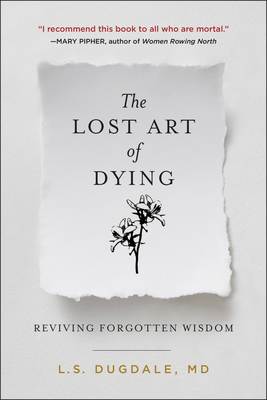
The Lost Art of Dying
Reviving Forgotten Wisdom
کتاب های مرتبط
- اطلاعات
- نقد و بررسی
- دیدگاه کاربران
نقد و بررسی

Starred review from April 20, 2020
In this probing analysis, Dugdale (Dying in the Twenty-First Century), director of Columbia University’s Center for Clinical Medical Ethics, considers how to change the current “death-denying” culture to help readers become more comfortable with death. She challenges the assumptions and habits that lead to a preponderance of medicalized hospital deaths, calling for a personal acceptance of mortality and a revival of community support for the dying, particularly support of those who would otherwise die alone. Sparing no details, Dugdale pulls readers into the ethical conundrums that doctors face with a gripping story of the night she resuscitated an elderly man three times before he died, following the wishes of his children to spare him more pain. Dugdale paints a picture of the medical “conveyor belt” that leads to one treatment after another, often without examining the wisdom or consequences of these actions. She also laments the lack of cultural practices that help people prepare for death, such as the Ars moriendi (Latin for the art of dying) literature of medieval Europe, which emphasized the importance of living well in order to die well. Dugdale discusses the wide variety of responses people have to near-death experiences (despite the expectation of it being a transformative event, many people report feeling or thinking nothing at all), and urges readers to think twice about hospitalization and resuscitation, especially for the frail. This illuminating and thought-provoking book will convince many readers to reexamine their assumptions about death and dying.

May 1, 2020
A physician draws wisdom from a late medieval text to transform our thoughts and fears about dying. When a terminal patient's life is prolonged with desperate medical procedures, that individual's final moments may be sadly compromised. Yet reliance on modern medical interventions has become increasingly common in our culture. As Dugdale, the director of Columbia University's Center for Clinical Medical Ethics, writes, "in failing to die well, we fail to live well." Beginning with a case study example, the author relates how woeful such a failure can be. The patient was an elderly man approaching the end of a lengthy battle with cancer, and no one in his family was prepared to acknowledge his approaching death, insisting that every effort be made to keep him alive. In his final hours, he suffered through several unnecessary resuscitations, resulting in a long, painful death. Such examples led Dugdale to seek out a more compassionate alternative. In her studies, she was inspired by the holistically grounded approach to dying examined in ars moriendi ("the art of dying"), a 15th-century text that contains intriguing reflections on death as an essential aspect of living requiring careful preparation. "Although more than six hundred years have passed, I have been repeatedly struck by the need for a similar handbook today," writes Dugdale. "That's why I wrote this book. Although some of the original ars moriendi content is less relevant to the diverse and global twenty-first century, it nevertheless offers rich wisdom on how we might die well." Throughout the book, Dugdale balances her clinical experience with an openly holistic mindfulness, and she thoughtfully expands on the relevant lessons of ars moriendi: acknowledging our human finitude, or what it means to be mortal; embracing a meaningful community; facing a fear of death; and giving consideration to the decision of whether to die at home or in a hospital or other setting. A wise and reassuring guide for confronting death.
COPYRIGHT(2020) Kirkus Reviews, ALL RIGHTS RESERVED.

May 1, 2020
In her many years of practice, Columbia University physician Dugdale has seen a lot of death, and here she rails against the overly medicalized way of dying, which is prolonged by unnecessary resuscitations and other intrusive interventions. Instead, she guides readers toward taking a holistic approach to this final stage by accepting the finitude of life, developing meaningful rituals, and involving their communities in end-of-life care. The overarching theme of the book is that to die well, one must live well, and that living well entails determining what ultimately matters and going through each day with purpose. VERDICT A readable and inspiring manual for living one's days fully and dying well.--Deborah Bigelow, Director Emerita, Leonia P.L., NJ
Copyright 2020 Library Journal, LLC Used with permission.

























دیدگاه کاربران